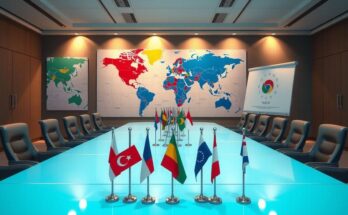The arrest of former President Rodrigo Duterte signifies a critical turning point in his feud with President Ferdinand Marcos Jr., posing potential risks to Philippine economic stability and governance. Duterte is set to face charges at the International Criminal Court related to his anti-drug campaign. The upcoming legislative elections and the impeachment of Vice President Sara Duterte add further complexity to the situation, as public opinion shifts and political alliances evolve.
The recent arrest of former Philippine President Rodrigo Duterte marks a significant escalation in the ongoing conflict with his former ally, President Ferdinand Marcos Jr. Initially collaborating to secure the nation’s last major election victory, they are now entangled in a feud that poses risks to the Philippines’ economic stability. Duterte’s arrest occurred just before he was set to face the International Criminal Court (ICC) over his controversial anti-drug campaign, which resulted in over 6,000 deaths.
This action comes shortly after the impeachment of Vice President Sara Duterte, with the Senate trial expected to begin in July, potentially impacting her political future. Marcos’ decision to proceed against Duterte carries significant risks as it could alienate voters, particularly with upcoming legislative elections in May that will affect his remaining term.
Despite Marcos’ growing popularity, his approval ratings have waned, especially in light of persistent inflation. This political turbulence may undermine public and business confidence, which is crucial for economic growth, as evidenced by a notable decrease in the stock market following Duterte’s arrest.
Duterte, who remains a controversial figure with many supporters, criticized the ICC’s warrant, arguing that such foreign issued requests lack automatic legal effect in the Philippines. However, Marcos has emphasized compliance with international obligations, shifting from Duterte’s previously China-aligned foreign policies to a stronger alliance with the United States.
The unfolding events have sparked varying reactions domestically. While Duterte’s supporters rallied in response to his arrest, Sara Duterte condemned the government’s actions as a betrayal of national sovereignty, framing the situation as a surrender of Filipino dignity to foreign powers. Observers note that the lack of immediate backlash could embolden the Marcos administration to move against Vice President Sara Duterte in her ongoing impeachment.
This complex situation illustrates the changing power dynamics within Philippine politics and the potential ramifications for governance and economic policy going forward. With both Marcos and the Dutertes holding considerable sway, the unfolding political drama will undoubtedly shape the Philippines’ future.
In conclusion, the arrest of Rodrigo Duterte is a pivotal moment that could considerably impact the political landscape of the Philippines. The feud between the Marcos and Duterte families not only poses risks to the stability of governance but also threatens economic growth as public sentiment fluctuates amidst these developments. The responses from key political figures and the public will play a crucial role in determining the future political dynamics and potential reforms in the country.
Original Source: gulfnews.com




